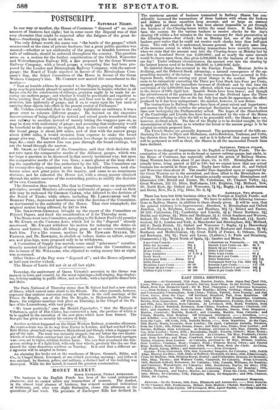POSTSCRIPT.
SATURDAY NIGHT.
In one way or another, the House of Commons " disposed of" no small amount of business last night; but in some cases the disposal was of that easy character that might be expected after the fatigues of the great de- bate— ihandoning the work set down.
The only debate worth the name was "the battle of the gauges," which commenced at the time of private business: but a great public question was mooted—whether or not uniformity of the gauge, or breadth between the mils of railroads, should be enforced throughout the country. The question arose on a motion for the further consideration of the Oxford, Worcester and Wolverhampton Railway Bill, a line proposed by the Great Western Rail way Company, with a broad gauge; a competing line had been pro- posed by the London and Birmingham Railway Company, with the narrow gunge; the Board of Trade reported in fhvour of the Birmingham Com- .pany's line, the Select Committee of the House in favour of the Great Western Company's line. Mr. COBDEN now moved this amendment to the motion-
" That an humble address be presented to her Majesty, praying that her Ma- jesty may be graciously pleased to appoint a Commission to inquire, whether in all future acts for the construction of railways, provision ought to be made for se- curing one uniform gauge; and whether it would be practicable and expedient to bring existing lines of railway in England, and lines now in the course of con- struction, into uniformity of gauge; and if so, to report upon the best mode of carrying these objects into effect in the present session of Parliament."
Mr. Cobden contended, that in the early legislation on railways, it was a great error to tolerate different gauges. He insisted on the excessive inconvenience of being obliged to unload and reload goods transferred from one railway to another, instead of merely letting the waggons pass on, as may be done with uniformity of gauge: and assuming that uniformity would be beneficial to the country, he argued, that as the extent of railway with the broad gauge is about 300 miles, and of that with the narrow gauge about 2,000 miles, it would occasion least expense to make the broad gauge give way. That would also occasion less change in cuttings, tunnel- ings, &c.; since the narrow line can pass through the broad cuttings, but not the broad through the narrow.
Mr. SHAW, as Chairman of the Committee, said that their decision did not turn upon the comparative merits of the different gauges, which was too large a question to be discussed in that merely incidental way, but upon the comparative merits of the two lines; a mere glance at the map show- ing the superiority of the line authorized by the bill. The Committee sat for twenty-five days, examined more than a hundred witnesses, took ela- borate notes and great pains in the inquiry, and came to an unanimous decision ; and he exhorted the House not, with a strong muster obtained through the active canvass of the contending parties, to nullify the decision of its own Committee.
he discussion thus turned, like that in Committee, not on antagonistic principles; several Members advocating uniformity of gauge,—and on their side may be reckoned Sir GEORGE CLERIC, who adhered to the decision of .the Board of Trade; while others, including Mr. LABOUCH.ERE and Sir ROBERT PEEL, deprecated interference with the decision of the Committee, as detrimental to the authority of the House. That view triumphed; the Original motion being affirmed, by 247 to 184.
The SOLICITOR-GENERAL brought up the report of the Committee on Printed Papers, and fixed the consideration of it for Thursday next.
The House went into Committee, according to Sir Robert Peel's old promise to Mr. Ewart, on the Customs Acts; which led to the " disposal " already 'mentioned. Mr. EWART withdrew his motion for reducing the duties on cheese and butter; his friends all being gone, and no voters remaining to back him. For a like reason, motions by Mr. EDWARD BULLER, Mr. PARKER, and Dr. Bowispro, to abolish or reduce duties on tallow, copper ore, and pine-logs, were proposed only to be withdrawn. A Committee of Supply was moved; some small "grievances" constitu- tionally asserted their privilege of utterance; and then the Committee, at the instance of Mr. WILLIAMS, who objected to voting money late at night, was postponed.
Other Orders of the Day were " disposed of"; and the House adjourned at half-past twelve o'clock.
The House of Lords did not sit at all last night.


























 Previous page
Previous page